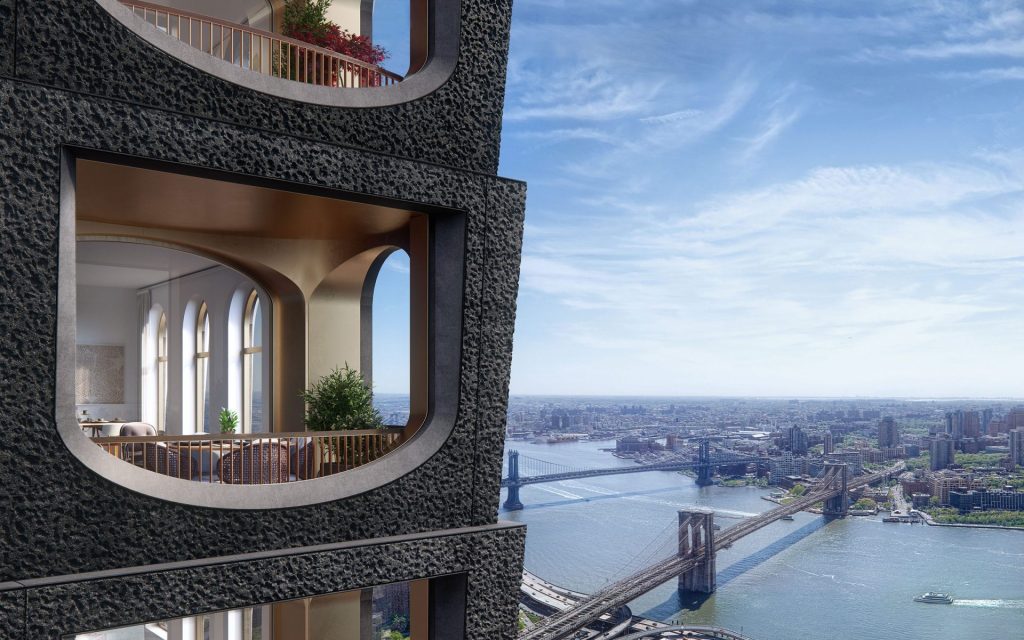Luxury condo sales at 130 William provide residential resurgence in downtown NYC
Contact The Author
In a much-needed flash of residential energy downtown, the 242 luxury condo apartments at Lightstone Group’s 130 William St. are nearly sold out, according to an analysis of public records posted on the city’s Department of Finance ACRIS database.
The flood of pricey purchases since marketing began in 2018 hopefully portends a resurgence for the whole area, which needs all the resurgence it can get.
The apartment sales are the real 130 William story, but have largely been eclipsed by puffy, design-focused stories about the 66-story tower’s views, classy amenities, and architect David Adjaye’s vision — which is like nothing else on the Lower Manhattan skyline.
The building’s public face is hard for anyone to miss. Huge, arched windows are set in a hand-cast concrete facade that reads as black from a distance, but softens to silver-gray at closer range. The structure’s monolithic, Moorish-reminiscent profile is as striking a departure from Downtown’s skyline as Rafael Vinoly’s all-white, square-windowed 432 Park Ave. is from Midtown’s.
Lightstone senior VP of development Scott Avram said, “130 William Street is over 90% sold and occupied and recognized as the best-selling condo tower in the city over the past few years.”
The impressive record was achieved during a five-year sales effort that included the near-three-year pandemic, when much of Lower Manhattan was desolate. Sensible pricing contributed to the project’s popularity. (Notwithstanding a few $10 million deals for penthouses, most units have sold in the $2 million-$3 million range, according to Finance Department data).
“Lightstone was smart by pricing their product reasonably at the outset, so they didn’t get the negative publicity of price-cutting the way some uptown locations did,” one analyst said.
In fact, most 130 William units sold at or very close to the original “asks.” Average prices were around $3,000 per square foot or less, compared with above $5,000 at 432 Park Ave. or even higher at Extell’s Central Park Tower.
The surrounding area has seen a number of other heartening developments. The owners of long-stalled condo tower 125 Greenwich St. just landed a $313 million loan to finish the job. Whole Foods opened a massive store at Harry Macklowe’s One Wall Street. French department store Printemps is coming to the site in 2024.
The Century 21 discount fashion store, which appeared dead after it closed during the pandemic and later was expected to return in shrunken form, is to reopen this spring at nearly the original’s size.
Casa Cipriani atop the Battery Maritime Building lures fashionable uptowners to Manhattan’s East River foot. The long-delayed Ronald O. Perelman Performing Arts Center at the World Trade Center is finally on track to open later this year.
However, the positive developments, welcome as they are, hardly negate Downtown’s challenges as it struggles to recover from the pandemic.
Its near-90 million square feet of offices had a 21% vacancy rate at the end of 2022, according to the Downtown Alliance. Only some large renewals saved the area from even worse numbers. Brokers told Realty Check that vacancies run as high as 35% at older and obsolescent buildings in the district’s heart.
But the data also include three modern buildings that are entirely empty, most notably 60 Wall St., the former Deutsche Bank tower with 1.6 million square feet.
Asking office rents continue to ebb downward. Two World Trade Center seems no closer to rising than it did 10 years ago as Larry Silverstein prays for a tenant. An attractive beer garden and art installation can’t hide the disappointment of a World Trade Center one tower short of a full quartet.
The WTC complex still doesn’t have a single full-service restaurant outside of Eataly. The Westfield Mall and the Oculus remain a food wasteland despite having a few fast-casual spots.
The residential picture, although healthier, is shadowed by site-specific problems. Developer Harry Macklowe faces what the Real Deal called a “reckoning” over $750 million in debt at One Wall Street.
The retail picture is mostly bleak. Between thriving Brookfield Place at the west end and the Tin Building food mecca and rejuvenated Seaport at the east end, Fulton Street and John Street present a sea of vacant storefronts.
The volume of dark space is hard to fathom, given a huge increase in pedestrian traffic. Especially on Fulton Street, the death toll has claimed a dozen fast-food and fast-casual spots that ought to be thriving.
Perhaps retailers and landlords will take comfort in all the affluent arrivals at 130 William St. and start making deals.








